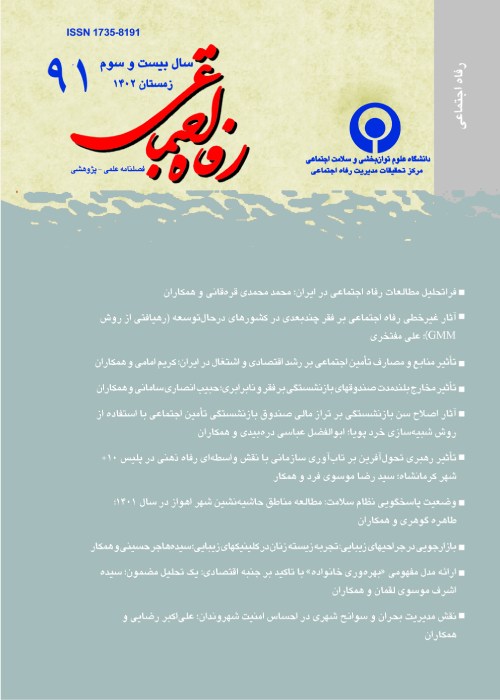The Relationship between Subjective Well-being and Quality of Educational Life among Students of the University of Social Welfare and Rehabilitation Sciences in Tehran
Author(s):
Article Type:
Research/Original Article (دارای رتبه معتبر)
Abstract:
Introduction
Students are one of the key stakeholders in the higher education system, and the low quality of life or their life satisfaction can be a starting point for deviating from the mission, ideals and strategies for the development of higher education and learning. The aim of this study was to investigate the students’ quality of life, subjective well-being and the relationship between them among students of all educational levels of the University of Social Welfare and Rehabilitation Sciences in the academic year of 2016-2017.
Method
In the present correlation study, the statistical population included all undergraduate, postgraduate and PhD students in the academic year of 2016-2017. The final sample size was 213 people and the samples were selected by a stratified random sampling method. In order to study the students’ quality of life, the Mehdi’s University Quality of Life tool was used. Golestani Bakhat questionnaire was used to measure the subjective well-being. Data were analyzed using t-test and structural equation modeling in SPSS and AMOS software.
Findings:
generally, 17.1% of women, 23.1% of men, 23% of undergraduate students, 15.9% of graduate students, and 16.1% of PhD students had a range of satisfaction between high to very high. Also, 19.4% of women, 19.2% of men, 20% of undergraduate students, 19.3% of graduate students, 19.4% of PhD students and 19.6% of the total sample had a range of satisfaction between low to very low. The most satisfaction of the students was first with their friends and then satisfaction with university cultural diversity, satisfaction with the university library, satisfaction with the job prospect Also, the least satisfaction was attributed to the satisfaction dimensions of university communication services, sports facilities, welfare and recreational facilities, university transportation facilities and medical services. According to achieved mean score in each dimension and total score, the mental health status of the total sample (M=180.56), female students (M=180.14) and male students (M=181.42) statistically was higher than criteria score (M=156). In the other words, subjective well-being of the studied sample was at a desirable level. Based on the results of fitted regression model (GFI=0.925, CFI=0.919, RMSEA= 0.082), about 15% of the variation in the students’ quality of life was explained by the dimensions of subjective well-being.
Discussion
The students’ quality of life is a multidimensional construct and its decreasing or increasing is affected by many factors. It is important that students not only should be provided by educational facilitates but also entertainment, cultural, sport and other related facilities are important so that they can drain the added amount of excess energy of education and study through these facilities. This, in addition to removing excess energy and fatigue of students, on the other hand, will stimulate the study and scientific activity of them.Language:
Persian
Published:
Social Welfare Quarterly, Volume:18 Issue: 69, 2018
Pages:
229 to 247
magiran.com/p1893045
دانلود و مطالعه متن این مقاله با یکی از روشهای زیر امکان پذیر است:
اشتراک شخصی
با عضویت و پرداخت آنلاین حق اشتراک یکساله به مبلغ 1,390,000ريال میتوانید 70 عنوان مطلب دانلود کنید!
اشتراک سازمانی
به کتابخانه دانشگاه یا محل کار خود پیشنهاد کنید تا اشتراک سازمانی این پایگاه را برای دسترسی نامحدود همه کاربران به متن مطالب تهیه نمایند!
توجه!
- حق عضویت دریافتی صرف حمایت از نشریات عضو و نگهداری، تکمیل و توسعه مگیران میشود.
- پرداخت حق اشتراک و دانلود مقالات اجازه بازنشر آن در سایر رسانههای چاپی و دیجیتال را به کاربر نمیدهد.
In order to view content subscription is required
Personal subscription
Subscribe magiran.com for 70 € euros via PayPal and download 70 articles during a year.
Organization subscription
Please contact us to subscribe your university or library for unlimited access!



